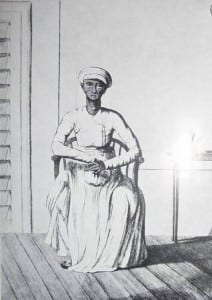“A Banyan is a person…by whom the English gentlemen in general conduct all their business. He is interpreter, head book-keeper, head secretary, head broker, the supplier of cash and cash-keeper, and in general also secret-keeper. He puts in the under-clerks, the porter or door-keeper, stewards, bearers of the silver wands, running footmen, torch and branch-light carriers, palanqueen bearers, and all the long tribe of under-servants, for whose honesty he is deemed answerable; and he conducts all the trade of his master, to whom, unless pretty well acquainted with the country languages, it is difficult for any of the natives to obtain access.” [f.n. W. Bolts – Considerations on Indian Affairs (1772-5) vol I p.84]. “Nominally their status was servile and they performed some menial tasks, such as managing their master’s household and his personal spending. But the banian of a prominent European was a man to be reckoned with…..Men like….Cantu Babu, banian to Warren Hastings, were among the richest and most influential members of the Indian community in Calcutta……They might appear to have become their masters’ servants, merely managing their trade for them; but the reality was often less that of master and servant than of trading partners. The banian brought his skill and his capital to the partnership; the European contributed his privileges.” [f.n.P.J.Marshall – East Indian Fortunes (1976) p.45].
Krishna Kanta Nandy (known as Cantoo Baboo) (c.1720-1794), the great-grandson of a farmer who migrated from the Burdwan District of Bengal to Murshidabad to set up business as a weaver of cloths, was a successful silk merchant at Cossimbazar when he became banian to Warren Hastings in 1754, serving him until his departure for England in 1764. It must have been Sykes’s previous knowledge of Cantoo and of his services to Hastings, especially after Plassey, coupled with Hastings’ recommendation which determined his choice of Cantoo as his banian.
Sykes’s official roles as Resident and subsequently as Governor of the trading factory at Cossimbazar would have occupied most of his time and energy in a climate which is immensely enervating for most of the year. His monthly reports to the Select Committee in Calcutta give detailed accounts of his work, the problems, the challenges and the achievements. He would have had little time to devote to his private trading, important though it was to his financial position. Cantoo seems to have been the ideal choice. He was an experienced trader, extremely astute, well able to take advantage of trading opportunities, but at the same time very cautious. As a devout Baisnab Hindu, austere and frugal, conservative, religious and conventional,he was above reproach in his private life. Undoubtedly, Sykes’s fortune owed much to Cantoo’s skill.
So what was in it for Cantoo? Sykes’s privileges as a Company servant (eg freedom from internal customs dues) for a start, but more than that: Sykes’s power and prestige were undoubtedly assets of which he could take full advantage and if Sykes became rich his own affairs would prosper. His situation as banian meant that he could branch out from one highly profitable business, silk trading, into others. Moreover it was a valuable insurance. At this time of transition Bengal could be a precarious place to carry on business – Cantoo must have realised that his interests were best served by attaching himself to one of the major players in the East India Company who would not only provide support for his own business dealings but also protection should things go wrong. The latter was amply proved after Sykes’s return to England when parliamentary committees began enquiries into the manner in which nabob fortunes had been acquired and, by extension, into the activities of their banians. Several letters written by Sykes to Warren Hastings, then in India, ask him to ensure that no harm comes to Cantoo. “Settle Cantoo privately and if possible peaceably otherwise he will from Party be in much trouble, my respects to him, his holding the lands I have explained till I am tired, they will not see the propriety of having substantial men in the management of the collections.” (f.n. F Sykes to W Hastings 13 May 1776 Add Ms 29137 f.189) and again “I fear Cantoo will suffer much from the spirit of the Party, you must place him somewhere, that he may enjoy what he has, in Peace and Quietness” (F Sykes to W Hastings 29 Mar 1777 Add Ms 29138 f.280-281). And years later,“I hope you will leave Cauntoo (sic) in a happy situation” (F Sykes to W Hastings 8 Mar 1785 Add Ms 29168 f.166).
The trust which Sykes placed in Cantu is demonstrated by a letter in which he wrote: “….. I need say nothing here regarding my situation as Cantoo can tell you how I stand in every circumstance. I never hided anything from him…” (f.n. F Sykes to W Hastings 28 Jan 1773 Add Ms 29133 f.347). The friendship was reciprocated. On 22 February 1785 Cantoo sent what must have been a large amount of mango chutney to Sykes (in the order written Sikshi Shahab) in England at a cost of 54 rupees, a substantial sum for such a commodity. (f.n. S C Nandy – Life and Times of Cantoo Baboo vol. II p.275).
